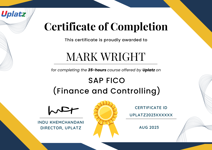
Chief Operating Officer (COO) Premium Career Track
Program consisting of courses to help you fulfil your dream of becoming a C-Level Executive (COO) in a top organization
Uplatz
Summary
- Uplatz Certificate of Completion - Free
Add to basket or enquire
Overview
Uplatz provides this intense Premium Career Track program on Chief Operating Officer (COO). It is a program covering all topics related to managing the operations and functioning of an organization, as self-paced video lectures. The program will help you pursue a career towards becoming a COO. You will be awarded Course Completion Certificate at the end of the course.
This Premium Career Track - Chief Operating Officer (COO) program by Uplatz includes the following courses:
- Business Intelligence and Data Analytics
- SAP BPC (Business Planning and Consolidation)
- SAP PP (Production Planning)
- SAP QM (Quality Management)
- SAP S/4HANA Logistics
- SAP MDG (Master Data Governance)
- SAP GRC (Governance Risk Compliance)
- Leadership and Management
- Fundamentals of Project Management
- Product Management
- Business Finance and Financial Modeling
- Financial Accounting and Reporting
- Cost and Management Accounting
The Chief Operating Officer (COO) is a senior executive tasked with overseeing the day-to-day administrative and operational functions of a business. The COO typically reports directly to the CEO and is considered to be second in the chain of command.
The COO role is a key member of the senior management team, reporting only to the Chief Executive Officer (CEO). You’ll have to maintain control of diverse business operations, so we expect you to be an experienced and efficient leader. If you also have excellent people skills, business acumen and exemplary work ethics, we’d like to meet you.
Course media
Description
A Chief Operating Officer (COO) is usually the second highest-ranking executive in a company, and reports directly to the Chief Executive Officer (CEO). Although the role of the COO will differ from organisation to organisation, their main responsibility is to oversee the end to end operations of a business.
COO responsibilities include:
Operational Oversight: The COO is responsible for overseeing all aspects of the organization's day-to-day operations, ensuring that processes and systems are running smoothly and efficiently.
Strategic Planning and Execution: The COO works closely with the CEO and other executives to develop and execute the company's strategic plans and initiatives.
Performance Management: The COO monitors key performance indicators (KPIs) and operational metrics to evaluate the organization's performance and identify areas for improvement.
Cross-Functional Collaboration: The COO fosters collaboration and coordination among different departments and teams to ensure alignment and seamless execution of strategies.
Resource Allocation: The COO is involved in resource planning and allocation, ensuring that the organization has the right people, technology, and infrastructure to support its objectives.
Risk Management: The COO identifies and manages operational risks, implementing risk mitigation strategies to protect the organization's interests.
Process Improvement: The COO drives continuous improvement initiatives, streamlining processes, and optimizing workflows to enhance efficiency and productivity.
Talent Development: The COO is responsible for developing and nurturing a high-performing and engaged workforce, fostering a culture of learning and development.
Budgeting and Financial Management: The COO collaborates with finance and accounting teams to develop budgets and manage financial resources effectively.
Communication: The COO communicates operational updates, challenges, and achievements to the executive team, the board of directors, and other stakeholders.
Crisis Management: The COO plays a critical role in managing crises and ensuring business continuity during challenging situations.
Vendor and Partner Management: The COO oversees vendor relationships and strategic partnerships, ensuring effective collaboration and value delivery.
Regulatory Compliance: The COO ensures that the organization complies with relevant laws, regulations, and industry standards.
Customer Experience: The COO focuses on enhancing the overall customer experience, ensuring customer satisfaction and loyalty.
Technology Adoption: The COO identifies opportunities for technology adoption and innovation to drive operational efficiency and competitiveness.
Overall, the COO plays a vital role in translating the company's vision and strategy into actionable plans, ensuring smooth operations, and contributing to the organization's overall success and growth.
Who is this course for?
Everyone
Requirements
Passion and determination to make it to the top of the corporate ladder!
Career path
- Chief Operating Officer (COO)
- Managing Director
- Head of Operations
- Chief Executive Officer (CEO)
- Chief Strategy Officer (CSO)
- Chief Risk Officer (CRO)
Questions and answers
Currently there are no Q&As for this course. Be the first to ask a question.
Certificates
Uplatz Certificate of Completion
Digital certificate - Included
Course Completion Certificate by Uplatz
Reviews
Legal information
This course is advertised on reed.co.uk by the Course Provider, whose terms and conditions apply. Purchases are made directly from the Course Provider, and as such, content and materials are supplied by the Course Provider directly. Reed is acting as agent and not reseller in relation to this course. Reed's only responsibility is to facilitate your payment for the course. It is your responsibility to review and agree to the Course Provider's terms and conditions and satisfy yourself as to the suitability of the course you intend to purchase. Reed will not have any responsibility for the content of the course and/or associated materials.



